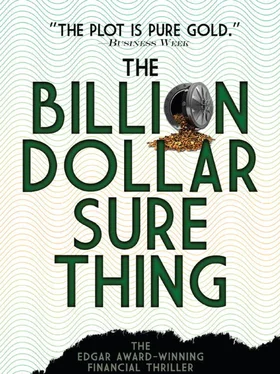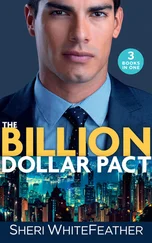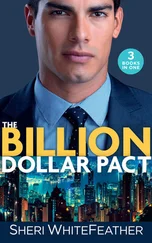“Hell, things just don’t happen that way,” he had told the minister. Then he had given the details about Mr. Stanley Rosen. The facts were clear. First, Rosen was in the Three Kings Hotel the entire time both before and after the theft of the red dossier from Bollinger’s safe. Second, Rosen was actually seen in company with the man who had organized this theft, ex-policeman Lutz, head of the Swiss Security Consultants A.G. They had staggered their way through almost every known bar within twenty kilometres of Basel—in Switzerland, France, and Germany—finally to bring back two prostitutes who were refused entry to the Three Kings. Third, the reports which the minister had received from New York confirmed beyond any doubt that Rosen was connected with the Mafia—and with the top people in that organization.
And then there was our fine Herr Dr. Hofer, chairman of the board of the General Bank of Switzerland. He was the only man to have seen the secretary of the treasury of the United States and the secretary-general of the BIS together in London. He was not exactly a fool. He could add two and two faster than anyone in Zurich. He probably also knew the work habits of Bollinger: The fact that, as a bachelor, he spent almost every weekend working and always took an enormous briefcase of papers with him to his house. And then back to the Swiss Security Consultants A.G. Who was their most important customer? The General Bank of Switzerland. Bernoulli did not for one split second doubt that a member of the Swiss banking community was capable of organizing such a project.
But the minister was not interested in such theories. The behaviour of the Russians was no longer in the realm of theory; it was a fact, a confirmed fact.
It had been difficult for Bernoulli to argue with this logic. The Russians had an obvious motive. They had had the opportunity to organize the theft in Basel. And they were following through consistently and brutally.
But then should they not pick up the head of Swiss Security Consultants, Rolf Lutz? Under sufficient pressure, surely he would confirm what had truly happened and settle the matter once and for all. The minister of finance said no. “If it is the Russians, we simply do not want to know.” Fair enough. Lutz was taboo because the Russians were taboo. But for Bernoulli that still had not been the end of it. During the long night after this conference, the problem had kept turning over and over in his mind. He could not dismiss Rosen and Hofer with such ease. In fact, the more he thought of Hofer, the more suspicious he got. If the Russian thing was too pat, maybe the Mafia thing was equally so.
Bernoulli had the advantage of coming from a banking family. They had come to Switzerland as Huguenot immigrants in the seventeenth century. Their French love of money plus Calvinism had soon produced family prosperity in their new homeland, and prosperity had led to the foundation of a private bank, a family bank, in 1796. His father was the ninth Bernoulli to head the institution. Now, as then, the only sign identifying the premises was a gold plate—24-karat gold—about the size of a calling card, mounted discreetly to the left of the massive oaken door leading into the building. It was marked with nothing more than an engraved B. To be sure, the letter was capitalized.
His father had been anything but pleased when George had chosen government work, instead of staying within the family fold. But he had never openly criticized George for his choice. There had remained no doubt in his mind that the blood which flowed in his son’s veins would only endure so much humanitarianism, or whatever it was that George was trying to accomplish over in Geneva and Bern. The true calling of practicing benevolent capitalism would inevitably take hold in time.
But George knew all about this kind of benevolence. He had, after all, heard it over the dinner table year after year as a boy. That’s why George Bernoulli went into government work. And that’s also why he watched all bankers with a totally jaundiced eye, including the good Doktor Hofer. More than once he had met Hofer at his parents’ home. How anybody could be five feet five and still look down on the entire rest of the world was beyond George. But Hofer managed it. And George’s father put up with it, because Hofer was, even then, at the top of the heap in Swiss banking circles. Big profits, always bigger than everybody else’s in the business. Never a setback. Uncanny, in fact, thought Bernoulli, impossible.
For there were some things that just could not find a logical explanation. For instance, metals. The General Bank of Switzerland had always specialized in precious metals. Unlike American or British banks, Swiss banks could be all financial things to all men. They were not only commercial banks, but also underwriters, stockbrokers, commodity dealers—the list was almost endless. They were the ultimate financial supermarkets. But even the big ones had their specialities. In the case of the General Bank, it had been gold, silver, platinum, palladium.
The 1960s, especially the latter part, had been great years for precious metals. During the entire period the General Bank was bullish and invested both their clients and themselves heavily. It was said that Hofer was behind this, and Hofer was never wrong. Sure enough, by 1968 all four metals reached record highs. The General Bank continued to be bullish and continued to buy, in spite of the temporary lull that followed. But, as time proved, there was nothing temporary about it. Month after month, year after year, prices of precious metals slid down. Silver went from $2.80 an ounce to $1.50. Platinum fell from $450 to $95. Palladium collapsed completely. Only gold held. Rumour had it that in the early 1970s Hofer’s bank had been forced to sell. Their continual attempts to prop up all four markets almost singlehandedly had simply eaten up too much of their liquidity. The losses must have been monumental. But what happened to them? Not a word in the annual reports. Not a clue in the balance sheets. In fact, profits kept rising consistently, year after year, at the rate of 20 percent.
Then there were those loans to Chile, Egypt, Algeria, Pakistan, Rhodesia. Together they must have involved at least $250 million. Big publicity when they were announced. But since then, not a word. Their repayment was quite obviously impossible. Their amortization could not be avoided.
Yes, there could be no doubt that a big, big killing in the gold and foreign exchange markets would come in mighty handy for Dr. Walter Hofer.
But what about this fellow Stanley Rosen? There could be absolutely no doubt that he was managing the biggest pool of illegal money ever to be packaged in the history of the United States. He was big! But he was apparently also extremely successful. This was very well known to the American authorities. Bernoulli knew; they had sent him a dossier on Rosen that was almost 200 pages long. A summary. Rosen had been investigated at least twelve times during the past five years. Almost every federal and state agency that could possibly find an excuse had already been through his shop. But there was nothing to find. Rosen did only one thing. He served as an investment advisor, on a fee basis, to some twenty-five or thirty offshore investment companies. All quite legal and completely in line with the regulations laid down in the 1940 investment act. His partner, Harry Stahl, ran a small brokerage company, with seats on both the New York and American exchanges, and recently also on the Pacific Coast exchange. He would accept brokerage business from the general public only when they almost forced their way through the door. That sort of stuff was just a nuisance. He was strictly interested in one client only—Stanley Rosen.
The whole system stood or fell with one link in the chain: the movement of the funds out of the United States. For once they were out, that was it. They disappeared into anonymous corporations in the Caribbean or other weird little countries spotted around the world, places to which the United States authorities had no access.
Читать дальше












